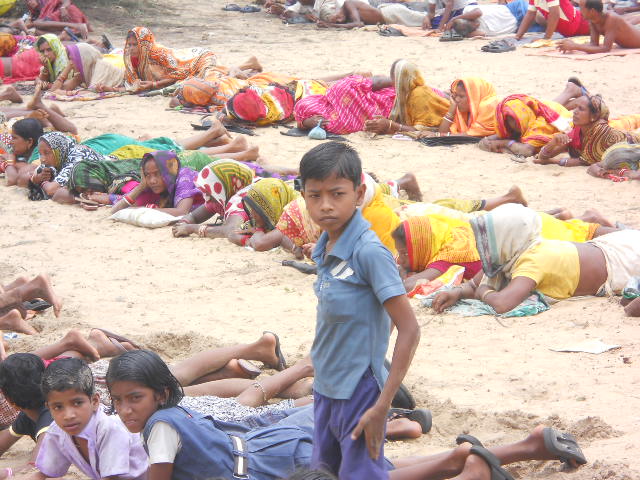
Women, school children were at the forefront of the anti-POSCO agitation
Who is to blame for the irreparable losses of not only natural resources and the prolonged suffering of human beings. Who will punish the guilty?
Our political leaders of mainstream political parties have bowed before global capitalism, and supposedly in the interest of ‘national development’ shouted ‘welcome’ to Rs. 52,000 crore of foreign direct investment in India by POSCO of South Korea.
From the prime minister to the chief minister of Odisha to the market economists and advocates of LGP (liberalisation, globalisation, privatisation), all have touted POSCO’s coming to Odisha as proof of the success of economic reforms in the country.
The dream project was in fact to loot the country’s rich natural resources like iron ore, water, land and seashore to ensure maximum profit through not only selling steel but also swapping our cheap iron ore in international market. The project involves the displacing of more than 20,000 villagers at the plant site and another 10,000 tribals at the mining site located near Khandadhar waterfall.
POSCO came in 2005 along with an investment of $ 12 billion in the steel plant project at Dhinkia-Govindpur of Jagatsinghpur district in Odisha aiming to have a production of 12 million tons per year, requiring 600 million tons of iron ore over a period of 30 years. It required 12,000 acres of land, including 4004 acres for steel plant, 2000 acres for township and associated infrastructure and 6177 acres of forest land of Khandadhar hills for mining of iron ore.
For only steel plant 22,000 residents of 7 villages were to be affected as displacement from livelihood system for ever. As the project was likely to be constructed in the sea shore, it was feared that as many as 20,000-25,000 local fishermen were to be affected. Thousands of tribals in Khandadhar mining area of Sundargarh district to be affected at proposed mining site of famous waterfalls. This is the natural habitat of primitive tribal like Paudibhuyans.
The proposed plant stood to disrupt a thriving local economy based on cultivation of paddy and betel leaf, fish farming and many coastal forest products. Betel leaf vines in particular were a source of decent income to its cultivators. According to a rough estimate at the early stage of agitation against POSCO, betel leaves brought in an income of at least Rs. 50 crore annually to the area out of sale of betel leaves outside the Odisha.
This area also has many ponds on private lands and there are natural water bodies linked to the sea. Shrimp culture is practiced by the farmers and traditional fisher folks depend on these water resources including the sea shore.
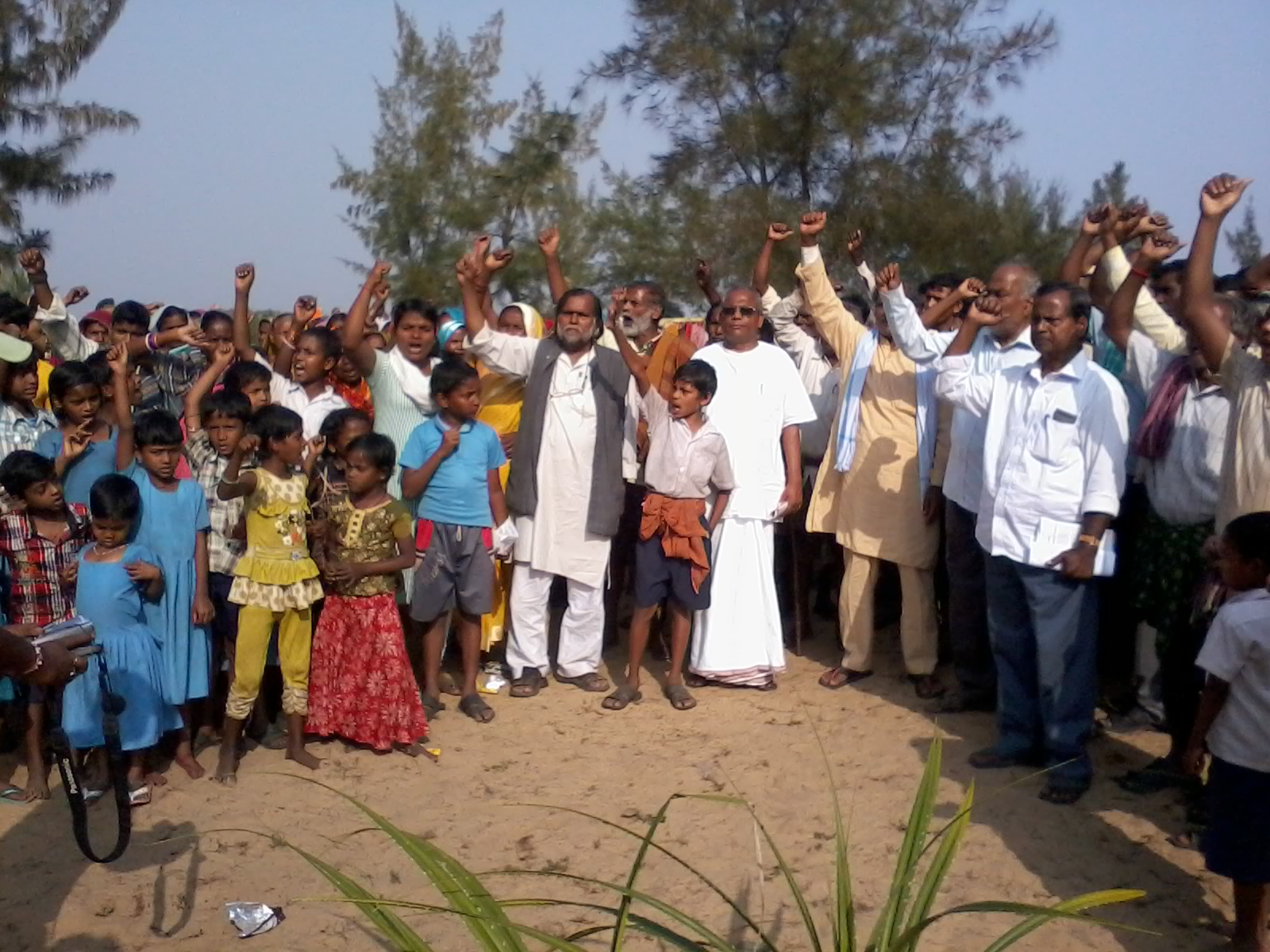
Images from the anti-POSCO agitation
Because of plentiful availability of work in the traditional economic activities, the daily wage here was highest in the state region as it needed labour force from outside before hundreds of betel vines were destroyed for the project in the year 2011-12.
Given the special natural feature of the region the POSCO project also raised concerns related to diversion of water from Mahanadi, its environmental impact, including the implications for endangered species and the coastal forest which acts as a natural barrier against cyclones.
The proposal for huge quantity of water diversion from Mahanadi river created panic among lakhs of people in Cuttack, the biggest city of Odisha and among farmers who would be deprived of water for irrigation.
Given a local economy that was both vibrant and sustainable, why think of destroying the nature-friendly livelihood of thousands for the sake of a steel plant?
The advocates of such paradigm of development through POSCO have no answer except that of market demand. So the accumulation of capital is a must for growth model which has nothing to contribute to poor people’s economic development.
The real face of growth by POSCO emerges when the potential profit from the proposed mining is calculated. The kind and degree of exploitation of resources is evident from the 2005 memorandum of understanding (MOU) between the Odisha government and POSCO.
As per the MOU, POSCO would be provided 600 million tons of high quality iron ore against payment of a royalty. The royalty was fixed at Rs. 27 per ton whereas the market price of iron ore at that time was Rs. 4,000 per ton and rose to Rs. 8,000 per ton in 2012. In between the royalty rate was increased to one tenth of market price still leaving a huge margin between royalty and market price of iron ore.
Experts say that the cost of exploration of one ton of ore is maximum Rs. 1,000. Therefore, POSCO stood to make a huge profit margin of not less than Rs. 5,000 per ton of iron ore. For the 600 million tons stipulated in the MOU, the total profit would be not less than Rs. 3 lakh crore from iron ore alone. The profit from steel was of course extra.
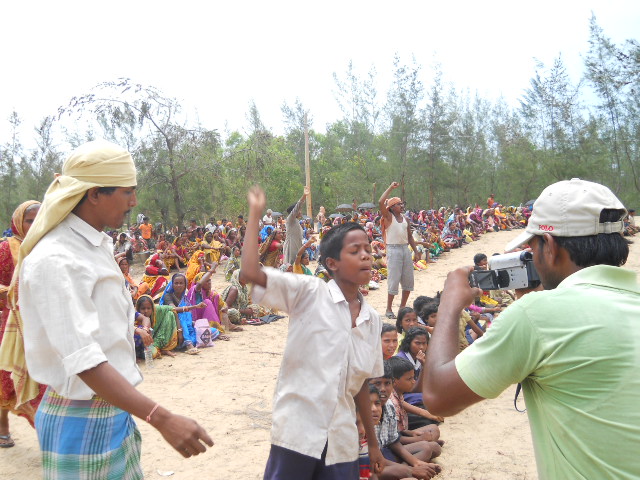
Images from the anti-POSCO agitation
Here we can judge how people in power are so crazy to open the gates for the looting of our resources, resulting in mega profits for corporate giants and loss the national exchequer. Before POSCO came to India for this project, it had been to Brazil which had five times more iron ore deposits than us. When Brazil asked the company to pay market price, POSCO turned to China which too was not interested in the terms offered by the company.
It is then that POSCO came to India where our leaders offered to sell iron ore to the company at a royalty far below the market price. The royalty system is a usual practice of political leaders as it opens up the possibility of kickbacks and underhand dealings. Who cares about the country and its marginalised people? The personal interests of politicians and bureaucrats are what matter and development is the name of the game.
The Nobel laureate Joseph Stiglez has rightly noted that globalisation is nothing but barbarisation. This has been evident in Odisha’s industrialisation process. The POSCO deal involved a secret deal between politicians in government and the company’s owner. It is widely believed that a lot of money changed hands before the deal was signed. And there were other perks too.
The state’s chief secretary and the secretary, mines got to enjoy foreign trips ostensibly to visit the company’s steel plant in South Korea. As the people’s struggle against POSCO was growing, to befriend the media, 17 journalists of Odisha were offered a visit to Korea by POSCO. After returning from their pleasure trip some of the journalists waxed eloquent about how POSCO would turn Odisha into paradise.
For a venture that promises a bumper profit of a minimum of Rs 3 lakh crore what would a corporate giant not do to cultivate friends in the right places?
To silence any opposition to such loot of Odisha’s resources, POSCO India created a fund called ‘Tribal Fund’. POSCO clearly was following in the footsteps of the US multinational Enron which spent Rs 60 crore to “educate Indians” who opposed its power project in Maharashtra.
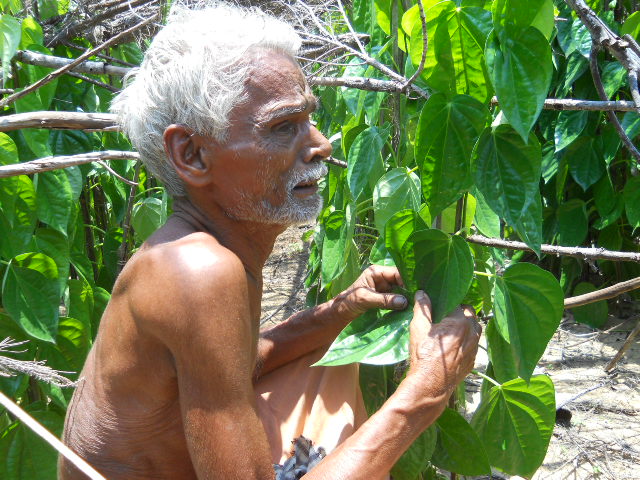
Images from the anti-POSCO agitation
From the very beginning the people of Dhinkia-Govindpur along with other villages protested against the “dream project” which they knew would destroy their thriving, sustainable local economy. The Odisha government used the police to force the people to give up their land. But determined to fight for their right to life and livelihood the villagers courageously faced the brutal police as well as muscle power hired privately.
The long-run democratic people’s struggle under the Posco Pratirodha Sangharsha Samiti (PPSS) lead by Abhaya Sahu, who had to spend two years in jail, effectively resisted the government-backed company’s construction work. This was a historic movement for more than one reason. Firstly, women were in the forefront of the struggle. Secondly, school going children left their classes and joined their parents in confronting the armed police force to protect their betel vine orchards from being taken over. Thirdly, this struggle not only opposed the attempted displacement but also exposed the real face of corporate loot in the name of development wherein democratic and human rights are made subservient to profit-making.
Between 2005 and 2013, there was continued police repression to forcibly take over betel vine land on the ground that it was forest land owned by the government. During this period, the police resorted to frequent lathi-charge, arrested and seriously injured protesting villagers including women. Hired goons masquerading as local supporters of the POSCO project hurled bombs and killed three villagers.
Around 300 false cases were filed against more than 1,000 individuals protesting the POSCO-India project. These included charges of attempt to murder and kidnapping. For a long time the villagers could not go outside their villages even to hospitals for fear of police arrest. Women especially suffered a lot as they were deprived of medical treatment.
The state’s repression resulted in serious human rights violations. Under the Constitution, the state is obliged to protect fundamental rights of people. Instead, the executive showed contempt for the rule of law, even acted against the law, violating the forest dwellers’ right to life and democratic dissent and laws regarding protection of the environment.
Around 75% of the land in the area is classified as forest land. For several hundred years villagers have been using this land for agriculture and forest products. The Meena Gupta Committee appointed by the ministry for environment and forest (MoEF) of the central government unanimously recommended that the land right be distributed democratically through gram sabha before land acquisition. The villagers are forest dwellers as per Forest Rights Act (FRA) 2006. But the state government denied them their rights for the vested interest of the company.
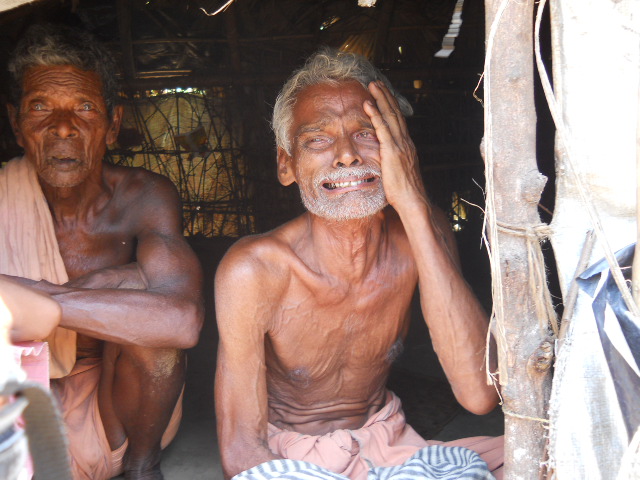
A public hearing held for environmental clearance was intended to make an Environmental Impact Assessment of a 4 million tons capacity steel plant. But based on this assessment the MoEF fraudulently gave a clearly for a 12 million tons project.
As an environment and human rights activist and an active campaigner in the anti-POSCO movement, I challenged such illegal environment clearance and also filed a PIL with the National Green Tribunal (NGT) challenging the large scale illegal chopping of cutting trees. Without any clearance more than 2 lakh trees were cut down. The NGT stayed further cutting.
Later, after the order of the NGT, the MoEF reviewed its earlier order and gave clearance for an 8 million ton steel producing plant. This has also been challenged and it was pending till April 8 of this year. On that day POSCO clarified that it was neither going to complete the project in 2017 nor was it ready for any construction work. This indicates that POSCO has decided to abandon the project.
It could not get the mines in Khandadhar till now, nor has it been allowed to draw water from the Mahanadi river. It also failed to renew the memorandum of understanding with the state government which expired in 2010.
The earlier MOU was full of concessions to POSCO at every stage: from Special Economic Zone (SEZ) approval to swapping of iron ore, to export of an extra 400 million tons to its steel plant in South Korea. Because of strong and effective people’s movement, though they did not oppose the establishment of the plant, mainstream opposition political parties too questioned the mega profits that would flow to the company. The left parties have supported the people’s struggle against POSCO throughout.
The biggest irony is that though the Odisha government had recommended mining lease in Khandadhar, the central government is talking of participation in an auction of mines. At the same time the tribal resistance continues not to allow any company to engage in mining in Khandadhar Hill which should be treated as national natural heritage.
In any case, the gram sabha has to decide whether mining be allowed or not as there are primitive tribals like Paudibhuyans living there. It has to follow Niyamgiri where in 2013 gram sabhas rejected the mining of bauxite in the area following the historic judgment of the Supreme Court.
With the announcement by POSCO of its inability to proceed with its project, there is no doubt that it is the victory of people’s movement lead by PPSS. Those people who were forced to leave their land are now languishing in villages without any means of livelihood. There is no food security for them. The area was surrounded by the police force till 2014. Hundreds of villagers face false criminal charges pending in courts and police stations. Huge environmental damage has already been done with the cutting of 2 lakh trees which were a barrier to cyclone and heavy winds on the coast.
Another story of human rights violation has been suppressed by the corporate media. In the beginning of people’s resistance, the district administration along with POSCO India managers had persuaded and motivated about 40 families to leave their villages with assurance of proper rehabilitation. These families were projected as victims of the anti-POSCO struggle. But they were kept in a transit camp for ten years without any civic amenities and human dignity.
Frustrated, they have revolted against the betrayal by the company and the administration and have returned to their villages. In the interim, they lost their means of livelihood as well as their children’s right to food security and education. Now with the company poised to make an exit, neither the administration nor the company is ready to be accountable for their agony, economic and social losses. This is the true, inhuman face of corporate game players.
All the hype of Rs. 60,000 crore FDI flowing in to the state has disappeared. Instead of the ‘dream project’ all that remains is disillusion and suffering.
POSCO had entered India as an agent of global imperialism. Though based in South Korea, American banks and companies had 40% of investment and a mining giant like BH Bilton had 20% investment in POSCO India project. That is why the Indian government and all mainstream political parties wedded to the market economy were keen to support POSCO and had extended to it a warm welcome.
Had the plant gone on stream, it would have provided a maximum of 6,000 jobs, with half of them as temporary daily wage earners. But the livelihood of more than 20,000 people at the proposed plant site and another 10,000 tribals at the mining site would have been sacrificed.
As POSCO had been awarded a special economic zone (SEZ) status, the state and the Centre would have lost more than Rs. 22,000 crore in tax revenue for 10 years. Water scarcity would have resulted in people’s unrest and the demand for the closure of the plant.
If mining in Khandadhar were permitted, not only would the tribal community be displaced from their natural habitat and sustainable livelihood system, the natural flow of water from Khandadhar Waterfalls to the Brahmani river would have ceased. As a result of this people depending on this river would be serious affected.
The mining policy of the central government must be radically changed to end the system of leasing out strategic mines and minerals. There should also be a limit on mines exploration and the same should be aimed at the fulfillment of national needs. Whatever is mined should be sold at market price so that the state generates substantial revenue instead of the current royalty system which only fills corporate coffers.
The substantial revenue so generated could be invested in new industries which are for public good and in the national interest. With such an approach we would be better able to preserve our limited resources for future generation as well as ensure ecological balance. The current politics of development under the globalisation mantra only serves the interest of corporate giants like POSCO India.
The question remains as to who is to blame for the irreparable losses of not only natural resources and the prolonged suffering of human beings. Who will punish the guilty?
With POSCO-India having decided not to start construction work, the environment clearance expires in 2017. But the company is yet to announce its decision to scrap the project. Therefore it is the moral as well as legal responsibility of the state and the central governments to send back POSCO-India and to recover from it compensation for the loss of more than 2 lakh trees in order to regenerate forest cover.
The people should be granted their right to the forest land which was forcibly taken over by the government for the POSCO project. All false criminal cases against villagers must be withdrawn. Also the peace-loving villagers should be adequately compensated for their loss of livelihood; the region should be assisted in the restoration of its vibrant rural economy; the democratic and constitutional right to life and livelihood of the people ensured. And, the tribals of Khandadhar should be bestowed with the right of its gram sabha to protect the habitat from rapacious mining.
(The author is president, Lok Shakti Abhiyan and convenor of National Alliance of Peoples' Movements (NAPM))